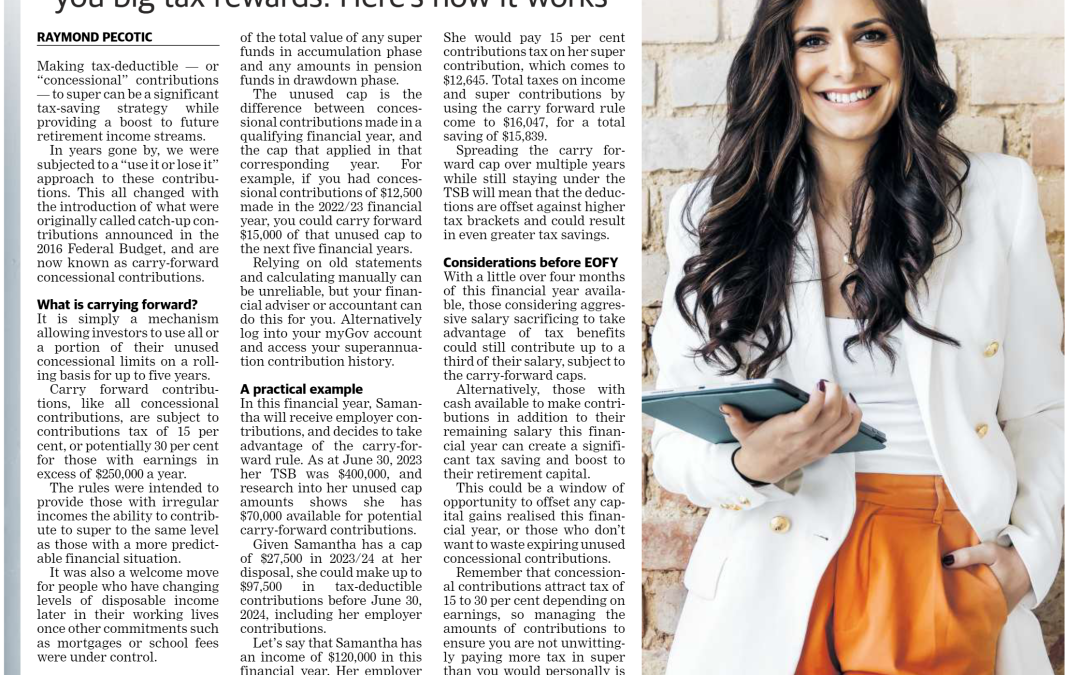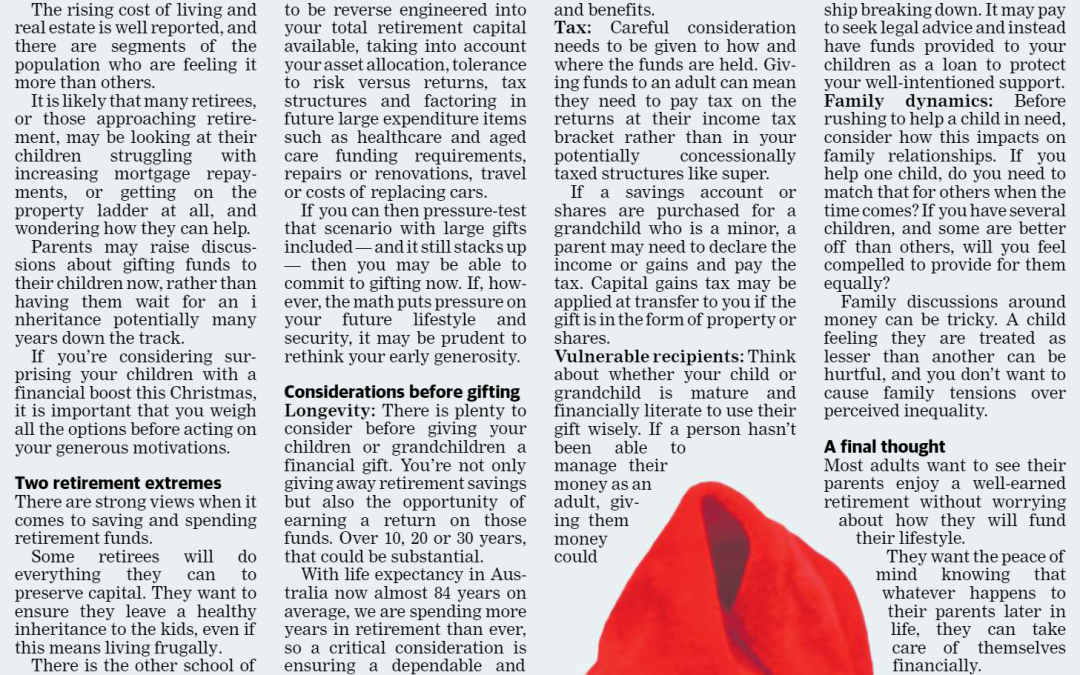This article first appeared in The West Australian, Your Money, 6 November 2023
You may have heard the saying that the only certainties in life are death and taxes. Death and probate taxes were abolished throughout Australia by the early 1980’s, however there is a potential inheritance tax by disguise hiding in your super or pension fund you may not even know about.
The good news is that it is avoidable.
Keeping money in superannuation or pension has the significant benefit of being concessionally taxed at 15% on earnings and 10% on capital gains in accumulation mode. The story gets even better in pension phase where there is no tax on earnings or capital gains at all on balances up to $1.9m
However its important investors strike the right balance between paying less or no tax now while they are enjoying the funds, and the risk of the funds being taxed upon their death.
Funds paid to tax dependents, for example between a husband or wife, are not usually subject to this tax. However, if funds are paid out to beneficiaries that are not tax dependents, for example to adult, independent children, a lump sum death benefit could be taxed at 15% or 30% plus 2% Medicare levy.
So how is it best to manage this quasi death tax on our super?
Moving funds out of super
It is important to understand how much tax your beneficiaries are potentially exposed to. Only the taxable component of your balance is subject to this tax, so it is important to know what proportion of your funds are made up of taxable vs tax free component. Once you know what tax your non-dependent beneficiaries may be facing, it is important to get an understanding of what tax you are saving by keeping funds in a concessional or nil tax environment.
For young retirees, in good health, expecting to enjoy a long tax free retirement income stream, the tax benefits they’d receive over a 20 or 30 year period could outweigh any potential tax paid by beneficiaries. But older investors, or those in poor health, may calculate that the tax savings over the short term are not worth the risk of their beneficiaries paying tax.
If you determine that the risk of tax to beneficiaries outweighs the shorter term tax benefits, you could withdraw funds from the superannuation environment, and invest them in your personal name or other structure.
This is a delicate area and requires appropriate guidance and advice.
Recontribution strategy
Because this tax is only paid on the taxable component of your funds, the aim of a superannuation recontribution strategy is to reshuffle the different components of a superannuation fund in favour of the tax-free component.
To achieve this, assuming you have met a condition of release – retired from age 60, terminated a contract of employment after age 60, or have reached age 65- you can withdraw money from your super fund that holds substantial amounts of taxable component, and recontribute these funds as non-concessional contributions.
Various restrictions, such as contribution caps, total super balances and the requirement to meet the “work test” if you are over the age of 74 (proving you had worked at least 40 hours in any consecutive 30 day period in a financial year) can make this strategy sometimes difficult to execute.
If you can get the right assistance with juggling the various caps and restrictions, it could be possible to eliminate some, or even all, of the potential tax liability.
Furthermore, in some cases the ability to recontribute to your spouse’s superannuation fund can, in addition to reducing your tax liability, have the added benefit of potentially boosting eligibility to Centrelink benefits.
Binding Death Nomination to your Estate
Funds paid directly from your superannuation or pension fund to a non-dependent beneficiary will attract an additional 2% Medicare levy on top of the 15% or 30% tax liability that could exist.
By directing benefits via your will, and having your estate distribute funds to your beneficiaries this 2% Medicare levy is avoided, even if the recipient of your funds is a non-dependent.
This involves nominating your Estate, or Legal Personal Representative, on your fund nomination forms.
Bear in mind this may have some potential draw backs, as there are situations where it is advantageous to have benefits bypass your estate and be paid directly to specific beneficiaries.
Appoint a Power of Attorney
While a Will is an important document, it is also very important to appoint an Enduring Power of Attorney to assist with financial matters when you can’t.
A Power of Attorney may be able to make decisions on your behalf if you incapacitated and take appropriate steps to prepare your funds for the best possible outcome for your beneficiaries.
If you have an advisor, ensure that your Power of Attorney knows who they are and they have open channels of communication for situations where they may need to work together when you can’t.
Everyone’s circumstances are different, and there are many considerations that can impact on the effectiveness and ability to execute the options listed above. It is therefore important to seek professional advice tailored to your individual situation.



